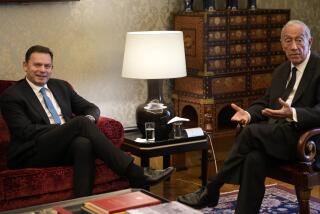Portuguese Communists Resist Reforms
- Share via
LISBON — The winds of change have forced reform on Communists throughout Europe, but veteran leader Alvaro Cunhal is keeping his Portuguese party firmly on the traditional course.
“Our party continues to declare itself a Marxist-Leninist party,” he told 2,000 delegates to the group’s congress in May in Loures, a Communist bastion 12 miles from Lisbon.
“Few of our comrades have expressed the opinion that the Portuguese Communist Party should follow the path that other Communist parties have trod,” Cunhal said.
Delegates raised clenched fists in salute and cheered their leader, who is 76 and has led the party since 1961. They reelected him unanimously despite hints earlier this year that he might retire.
The congress also chose Carlos Carvalhas, a 48-year-old economist and member of the European Parliament, for the new post of assistant general secretary.
The combination of Cunhal and Carvalhas, who is more pragmatic but not a member of the reformist wing, may be an attempt to mend the rift between dissidents and the old guard.
Reformers want the party to adapt its political program to reflect the new situation in Eastern Europe, where the Soviet bloc has collapsed, and Portugal’s position as a stable democracy within the 12-nation European Community. They also demand greater democracy and openness in party operations.
Party leaders have dealt firmly with dissenters.
Zita Seabra, a leading campaigner for women’s rights, was expelled from the ranks in January after arguing for Cunhal’s resignation, a change in the party name and abandonment of traditional ideology.
Jose Luis Judas, a trade union official and leading critic of Cunhal, was barred from the Loures congress. Other critics have been dismissed from the party Central Committee.
At the congress, Cunhal accused reformers of “forming factions that act in a conspiratorial and organized way within the party and carrying out a media campaign that places their action in a wider anti-Communist campaign against the party.”
“This will not be permitted,” he declared.
Dissidents say only reform can halt a decline that has seen the party’s share of the national vote drop from 21% in 1979 to 14% last December, when local elections were held.
Some change has resulted from the fall of Communist regimes in Eastern Europe. Cunhal acknowledges that his former comrades “commited serious errors and isolated themselves from their people.”
He has paid lip service to the reforms of Mikhail S. Gorbachev, the Soviet president, but also said anti-Communist forces backed by the West could “compromise the building of socialism.”
Cunhal’s party supported the Soviet-led invasion of Czechoslovakia in 1968 and the Kremlin’s intervention in Afghanistan, which lasted nearly a decade. It was silent on the brutal repression of China’s pro-democracy movement a year ago and sent delegates to the Romanian Communist Party congress before Nicolae Ceausescu’s downfall and execution in December.
Despite media reports of poor health, Cunhal demonstrated in two lengthy speeches to the congress that he had lost none of his fiery speaking style.
Cunhal spent 12 years in prison under the right-wing dictatorship that governed Portugal for nearly half a century before a coup in 1974 opened the way for democracy.
His 40 years of resistance to the dictatorship, years in jail and torture by the secret police earned Cunhal legendary status among followers and the respect of political opponents.
Judas said recently that Cunhal would continue running the party even after retirement.
“Its a bit like Deng Xiaoping,” the senior Chinese leader, Judas said. “Even when he leaves the leadership, it’s he who commands.”
He said the party must change because “in the future, being a Communist won’t be the same thing as being a Communist in 1917. . . . If the Communist parties don’t change, adapt, then they’ll disappear.”
More to Read
Sign up for Essential California
The most important California stories and recommendations in your inbox every morning.
You may occasionally receive promotional content from the Los Angeles Times.













